
98.1K
Downloads
172
Episodes
Professional Tour Guides in Washington DC share the true and sometimes scandalous stories from history, DC travel tips and hacks, hidden gems and hilarious stories of what we‘ve heard on tours. Support our Pod: https://www.patreon.com/tourguidetellall
Professional Tour Guides in Washington DC share the true and sometimes scandalous stories from history, DC travel tips and hacks, hidden gems and hilarious stories of what we‘ve heard on tours. Support our Pod: https://www.patreon.com/tourguidetellall
Episodes

Thursday Jun 11, 2020
Betsy Ross and the American Flag
Thursday Jun 11, 2020
Thursday Jun 11, 2020
If you're interested in in more information, we find these sources helpful:
- https://sheroesofhistory.wordpress.com/2014/05/22/betsy-ross/
- http://historicphiladelphia.org/betsy-ross-house/what-to-see/
- http://historicphiladelphia.org/betsy-ross-house/what-to-see/
- For further reading, a sympathetic bio and portrait of early Philadelphia, check out “Betsy
Ross and the Making of America” by Marla Miller
You're Listening To: Becca Grawl, Rebecca Fachner
The Person Responsible for it Sounding Good: Dan King
Technical & Admin Work Done During Naptime: Canden Arciniega
Intro/Outro Music: Well-Seasoned from Audio Hero

Monday Jun 08, 2020
Malcolm X / Meridian Hill Park
Monday Jun 08, 2020
Monday Jun 08, 2020
"It becomes a huge rally point for all sorts of political statements that the residents of Washington DC wanted to make so rallies for Civil Rights, rallies for the poor, rallies to eliminate hunger. Meridian Hill Park becomes the focal point for all these things."
Tour Guide Tell All is proud to bring you this mini-episode on one of Washington DC's most beautiful spots, Malcom X Park / Meridian Hill.
Learn about this beautiful space on a hilltop overlooking downtown DC and about the remarkable woman largely responsible for its creation, Mary Foote Henderson. Also learn why the park has two different names, and how local residents found a unique way to take their park back from criminal elements.
If you’re interested in in more information, we find these sources helpful:
- "Meridian Hill Park, National Register of Historic Places website" https://www.nps.gov/nr/travel/wash/dc48.htm
- "Is it Meridian Hill Park or Malcolm X Park? Your Answer is Meaningful" https://www.washingtonpost.com/lifestyle/magazine/is-it-meridian-hill-park-or-malcolm-x-park-your-answer-is-meaningful/2018/11/02/610af0e2-d07e-11e8-b2d2-f397227b43f0_story.html
- Meridian Hill: A History, by Stephen McKevitt (History Press, 2014)
You’re Listening To: Dan King & Canden Arciniega, who also pretended to be sound engineers on this episode.
Intro/Outro Music: Well-Seasoned from Audio Hero
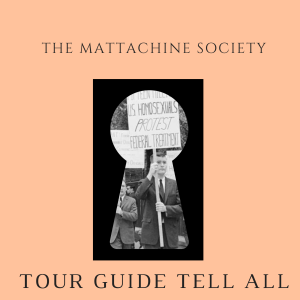
Friday Jun 05, 2020
The Mattachine Society
Friday Jun 05, 2020
Friday Jun 05, 2020
"Frank Kameney, who does not have a law background, petitions the Supreme Court pro se, which means he does this on his own. They do not grant him cert, they do not hear his case. So that is the end of his suit for reinstatement so he goes on to really devote the rest of his life to gay activism. He helps to found the Mattachine Society. He also organizes the first LGTBQ protest in front of the White House in 1965."
Tour Guide Tell All celebrates the start of Pride Month with a look at early LGBTQ activism in DC.
Join us as we discuss Frank Kameney, the Mattachine Society and the early days of the struggle for Gay Rights.
Comments or Questions? Or have an idea for future episodes? Email us tourguidetellall@gmail.com
If you're interested in in more information, we find these sources helpful:
- Time Magazine: What Was It Like to Be an LGTBQ Activist before Stonewall
- Mattachine Society of Washington DC
- NBC News #Pride50: Frank Kameney
- The Lavender Scare Documentary
SUPPORT TOUR GUIDE TELL ALL BY BECOME A PATRON: http://www.patreon.com/tourguidetellall
You're Listening To: Becca Grawl, Rebecca Fachner
The Person Responsible for it Sounding Good: Dan King
Technical & Admin Work Done During Naptime: Canden Arciniega
Intro/Outro Music: Well-Seasoned from Audio Hero

Tuesday Jun 02, 2020
Final Flight, Final Fight: Interview with Author Erin Miller
Tuesday Jun 02, 2020
Tuesday Jun 02, 2020
"The reason we asked you on here was because your grandmother had a very special role in WWII, a role that a lot of people today still aren't always familiar with, so can you tell us a little bit about what your grandmother did during the war?
During WWII, my grandmother served with the Women Air Force Service Pilots, which was the first group of female military pilots for the United States Armed Forces"
Erin Miller's grandmother, Elaine Harmon, was a pilot during WWII. Her final wish was to be buried at Arlington National Cemetery. A request that was denied. Erin and her family continued the fight all the way to Congress.
Becca talks with Erin about her grandmother and the fight to have her buried in Arlington National Cemetery.
You can support Tour Guide Tell All by becoming a patron at www.patreon.com/tourguidetellall - we have a special offer right now where you can get an autographed copy of Erin's book!
Guest: Erin Miller
Erin Miller is the granddaughter of WASP WWII pilot Elaine Danforth Harmon. Erin has a J.D. from the University of Maryland School of Law, a Master's in international studies from the University of Leeds (UK), and a B.A. in history from the University of California, San Diego. She is a licensed attorney in Maryland, where she lives with her two Shiba Inus.
Erin has become an ambassador for the Women Airforce Service Pilots (WASP) of World War II by sharing her own story of honoring her grandmother who wanted to ensure future generations learn about the history of these trailblazing pilots.
Twitter: @millerlawmd
Instagram: @millerlawmd
Facebook: @officialerinmiller
Website: Finalflightfinalfight.com
Comments or Questions? Or have an idea for future episodes? Email us tourguidetellall@gmail.com
You're Listening To: Becca Grawl
Zoom Audio Fixer: Canden Arciniega
Intro/Outro Music: Well-Seasoned from Audio Hero
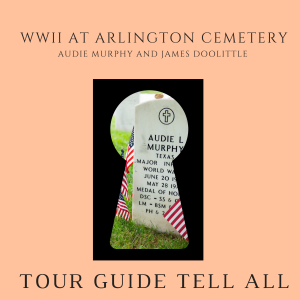
Thursday May 28, 2020
WWII at Arlington Cemetery
Thursday May 28, 2020
Thursday May 28, 2020
"As they are retreating, he's going to hold off the Germans on his own with his rifle as the men retreat. He's also on his radio directing artillery fire to the German lines. Once he runs out of ammunition in his weapon. He gets into the burning tank which is again on fire and could blow up at any moment, and takes the machine gun and starts firing at the Germans. He does this for an hour on his own."
UPDATE: We want to just make a quick correction to a statement made in this episode - both Medal of Honor AND Legion of Merit can be worn around the neck.
This week we talk about two of the many WWII figures buried in Arlington National Cemetery, Audie Murphy and James Doolittle.
You can get a full self guided tour of the cemetery (when it opens!) that includes Audio Murphy here: https://freetoursbyfoot.com/washington-dc-tours/walking-tours/arlington-cemetery/#self
PLEASE SUPPORT US BY BECOMING A PATRON - www.patreon.com/tourguidetellall
Comments or Questions? Or have an idea for future episodes? Email us tourguidetellall@gmail.com
If you're interested in in more information, we find these sources helpful:
- Free Tours by Foot DC's Guide to Arlington Cemetery
- Audie Murphy Grave Site
- James Doolittle Grave Site
- Military Times, Audie Murphy Made a Name for Himself in Battle and On Screen
- Air Force Biography, James Doolittle
You're Listening To: Becca Grawl, Rebecca Fachner
The Person Responsible for it Sounding Good: Dan King
Technical & Admin Work Done During Naptime: Canden Arciniega
Intro/Outro Music: Well-Seasoned from Audio Hero
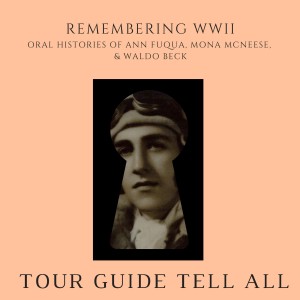
Tuesday May 26, 2020
Remembering WWII: Oral Histories
Tuesday May 26, 2020
Tuesday May 26, 2020
"You know where I was on VE Day? I was in Washington DC. The streets were so crowded the buses couldn't run"
Rather than listen to us talk about WWII, we interview three people about their experiences in the war.
- Ann Fuqua, who worked at the Navy Department in DC
- Mona McNeese, whose husband was a Japanese POW
- Waldo Beck, a Marine pilot stateside on VE Day waiting for orders to the Pacific.
These interviews were recorded on Zoom and flip phones, so the quality isn't always the best. We've included the transcript below.
Support Tour Guide Tell All on our Patreon Page: www.patreon.com/tourguidetellall or follow us on twitter @tourguidetell
Comments or Questions? Or have an idea for future episodes? Email us tourguidetellall@gmail.com
You're Listening To: Becca Grawl
Amateur Sound Editing: Canden Arciniega
Transcriptions: Rebecca Fachner
Intro/Outro Music: Well-Seasoned from Audio Hero
INTERVIEW TRANSCRIPTS:
Rebecca Grawl (RG): But I just wanted to ask you a couple of questions about WW2, what you remember, what it was like and if you remember VE Day, which was May 8?
Ann Fuqua (AF): You know where I was on VE Day?
RG: Where?
AF: I was in the city of Washington, DC, the streets were so full of people the buses could not run.
RG: wow
AF: I watched a big bottle of alcohol of some kind start way down the street and passed it hand by hand down the street til it was all cold.
RG: What were you doing in DC?
AF: I worked there for the Navy Department.
RG: Oh wow, what did you do there, can I ask?
AF: uhh, a little bit of this, a little bit of that, but the funny thing about it is that, uhh, when we went there to work, they told us, the people that we worked with, we never talked about that, we never talked about what we did, it all stayed inside that building and you know, I think that’s what happened, we didn’t have people checking us out or anything, we just did it.
RG: Well of course, during war time, you had to keep everything hush hush
AF: yeah yeah
RG: What was it like living in DC during the War?
AF: well, I like all the museums of course, we made it a point every weekend we spent it somewhere in a museum, but when we went out to the museum, but when we went out to the museum, it was all full of servicemen from everywhere. At the end of the day, we had to go to the museums together, and they’d buy their lunch, we’d buy our lunch and when the day was over, they went their way and we went ours. It was different.
RG: There were a lot of service members kind of coming through DC on their way to and from?
AF: Oh yeah. Well, you see, they had a big marine base there, they also had a big navy base there, and so we saw a lot of them. Some of them had already been overseas in action, and some of them, MOST of them had already been and had come back to Washington for some reason, I don’t know what.
RG: DO you remember things like; was there a lot of rationing in DC, where you had to ration food and supplies?
AF: Yes, we did. The navy department found us a place to live when they hired us, they told us they’d find us a place to live. And we lived with, it was a grandmother, a daughter and her daughter. Three generations in the house but yet they found room to rent a room to us. We hadn’t been there long and the grandmother approached me one day and she says “ Girls, I know you’re not eating your supper” right, and she says “If you will write home and get your ration books I’ll cook your meal at nighttime for 25 cents.” So course, we wrote home and got em mother didn’t need em and she was so proud, we could not have give (given) her a gift of any kind that was as good as our ration books. And she did cook, she was a great cook, yeah. So that was the only way it bothered us, we didn’t need gas, we didn’t need anything. She got our ration cards and we enjoyed it.
RG: Where we you from originally?
AF: (unintelligible), Mississippi
RG: Oh excellent. So was it a big change, moving to the city of DC?
AF: (Laughs) oh yeah, the furthest I’d been away from home was about a hundred miles away to Memphis and that was it. We rode up on a Pullman train and spent the night on the train and it was the first time I had ever seen the link sausage, that was the first time. They served them to us for breakfast, and oh I thought that was the best thing that I had ever had. Yeah, it was greenhorns going up there. Another one of my classmates went the same time as I did, and both of us was just as green as grass. We didn’t know anything, but we learned.
RG: If there was one thing you wanted young people today to know about WW2 or understand about that time in our country, what would you want them to know or to remember?
AF: Well, see I was in high school and we had a lot of men that was drafted out of high school, cuz when they turned 18, you know they could draft them. And I think what sticks with me now is they took those kids that had been just like me, just here, and that’s all, and they left here as boys, you might say but then when they came home they were men after they had fought through all of that. So I think that was about the biggest thing. And I don’t know as it really hit me til after it was all over. But that was kinda sad, it just took their youth away from them.
RG: That’s really interesting. Is there anything else you want to tell me about the war, about your experience during that time?
AF: I think one of the things that hit me the hardest, was when they opened up the concentration camps in Germany that they made pictures and they put them on boards almost as big as plywood, blew em up big, and set them at a lot of the entrances. They had them there at the Navy Department as we went in, that was sad. Now, I mean, with all the bombings and everything else, that was one of the saddest things that I saw. It was awful and of course they were blown up, they were bigger than what they really were but it was awful.
RG: I find it interesting that they actually had them for you guys to see at the Navy Department so that people would know of the atrocities and would know what had happened.
AF: They did. They even had the one, you know the Japanese had the little plane that one person, it was a bomb really, and one person sat in that plane and when he dove his plane into a ship, he went too, it was suicide, I think maybe they called them suicide bombers. They got one and they parked it in front of the Navy Department, and there his shoes was, down on the floor and they were made out of steel or something, and they were bolted to the floor, so they meant for them to stay with it. It was, it was a pretty big thing.
RG: Well, I really do appreciate you taking the time to share a little big about your experience, I’m a tour guide here in DC and we are preparing some videos and some information to share online with some of the students that can’t come to DC that would normally come this time of year to go to the WW2 and the Holocaust museum and those things
AF: Well there is one other thing, while I was up there, I worked on Massachusetts Avenue, you know it was Embassy Row. I worked in Lars Andersson’s mansion, which now is a museum, but they had everything taken out of it. I was the receptionist and none of the statues and none of that was there. But I worked there for a long time while I was there, and my grandson went back later, he lives up there now, and they were having a tour, so he got there one day just in time as they were having a tour group go through and so as the guide was talking about, and he told them, he said you know, my grandmother worked here during World War 2 and she says in all the years that I have been a tour guide, you are the first person that knew anybody that worked in this building, and of course now they’ve got it fixed up, the tapestries and all that in there.
RG: Yes, I sometimes take groups along Embassy Row and I’ve seen that building and its hard to image it as an office or a work site, but I know during World War 2 that was very common, a lot of these buildings were converted into government.
AF: It was a beautiful building, you went out back and there was a big garden out there in the back, you know, we used to went out there and ate our lunch every day.
RG: Not a bad place to go to work
AF: (Laughs) It wasn’t much work to it, I just answered the phone and checked everybody that came in. But that was quite an experience. Well, its been a pleasure to talk to you.
RG: Miss Ann, it has been so nice to speak to you, I so appreciate you sharing your experiences. You know this year marks the 75th anniversary of the end of the war and there was supposed to be a lot of celebrations to honor all those men who served and of course with the virus we can’t do that, so you being willing to talk online let me record you, I really appreciate that. I’ll email Gloria anything we use that includes what we talked about.
AF: Ok, well I tell you what it was quite an experience. It was quite an experience. But I wouldn’t take anything apart, but I just don’t want people to forget what those men went through during World War 2. You take now, they can get on computer and see em and hear from them all time, if we heard from them twice a month we were lucky. All we knew is if they had a new york address they were in Europe, if they had a California address they were in the South Pacific and that’s all we knew. We just didn’t know very much.
RG: A very important time. Well, thank you so much Miss Ann, please stay safe, please thank Rhonda for setting up the call for me.
AF: I sure will, cuz I don’t know a thing about this kinda stuff.
RG: Well thank you so much, you stay safe!
AF: ok, bye!
-----SECOND INTERVIEW WITH MONA MCNEESE----
RG: Hi, So I’m Rebecca, I’m with a company in DC called Free Tours by Foot and we’re talking to a few people about their World War 2 experience, and your son thought that you might like to talk to me for a few minutes.
MM: Well, (unintelligible) information, my husband didn’t talk very much about what happened to him and its true now that I probably forgot, but id be happy to help in any way that I can.
RG: Of course, well can you tell me a little bit about where your husband was from and where he served?
MM: Well, he was from, you want to know where he was from?
RG: Yeah, was he from Mississippi like you?
MM: He was from Quincy, Mississippi. Q-U-I-N-C-Y.
RG: And did he volunteer, was he drafted?
MM: He volunteered, very young.
RG: Did you know him then, or did you meet him after the war?
MM: I knew him after the war in 1945
RG: And do you know what branch he served in?
MM: He was in, I don’t know if they called it the cavalry but that’s what he started out, riding horses wherever he was stationed at, but anyway he was in the army to start out with. And I don’t know if at that time they called it the Army Air Corps or if it was just the Army, because in 1947 the Army Air Force split and you either had to go into the Army of the Air Force and he chose the Air force at that time.
RG: now during World War 2, how old were you during the war? MM: How old was he?
RG: I was going to ask how old you were during the war
MM: I was 15, well now lets see. In 41 I was 11 years old. I was born in 1930.
RG: DO you remember what life was like on the home front during the war?
MM: Well, it was hard, but it wasn’t compared to what other countries went through. They rationed. Do you want to hear what they rationed at that time?
RG: Sure yes.
MM: We could not get nylon hose, and shoes was hard to find because of the leather they used, you know and they couldn’t kill horses. I reckon they (unintelligible) shoes, I don’t know why, but anyway, you had to have a coupon to get shoes. We got it seems like 2 coupons a year for shoes and sugar was rationed. You had to have coupons to get thee ones, sugar and nylon hose and lets see what else, I forgot. There were probably other things that were rationed but I can’t remember what it was.
RG: And do you remember, were you able to get a lot of news about the war, were there letters or was a lot of it hard to find out about what was going on?
MM: We couldn’t, we were poor people, farmers growing up and we didn’t get a newspaper and most of the time we had a radio and sometimes we were tenant farmers so we moved around from house to house and sometimes we wouldn’t have electricity so we didn’t always have a radio, but we did most of the time and that’s the way we got our news.
RG: Tomorrow will mark the 75th anniversary of VE Day when the war was won in Europe, do you remember VE Day back in 1945. Can you tell me what you remember about that day or about that time?
MM: Well, all that I can say is that is just very happy it was over and thankful that, we were just so happy that man had made it through that we knew that there was a lot that was killed, but we knew that my husband was stuck in these prison for 39 months. Now I didn’t know him at that time, I knew him after he got back home.
RG: SO he was held a Japanese prisoner of war, did he ever talk about that?
MM: No, not at all. He didn’t talk about any of that. You know they didn’t get therapy when they come home like they do now. You know, if something happens to them they give them therapy, they just always told them just try to forget what had happened to them. And they just, I just hear different things, he was on Corregidor Island when he was captured and then a plane ride with their commander and he was captured near them. DO you need all this?
RG: No, this is wonderful.
MM: Anyway, they stayed on that island and I’ve read, I’ve got a book on it, they ate everything, all the leaves off the trees and they ate all horses over there. They were defending Pearl Harbor but they were on horses to get around on that island and they even had to kill the horses to eat them and they said one day about a mile from there they had ate the leaves off the trees, worms, every insect that they could find, any insects. It was bad.
RG: And you said he was held for 39 months.
MM: uh huh. When he was liberated he weighed 105 pounds, he was 5 foot 10, probably he was mainly skin and bones. Now the Japanese came in there and got him or got him captured and I don’t think they carried him by boat. How they got him to Formosa and I think they have changed the name of Formosa, now its something else. Anyway, he just about starved to death. But he didn’t hold it against them, the Japanese, because he said they were starving to death too. So, just something they had to go through with
RG: What a kind person to be able to not hold it against someone like that, that’s really lovely
MM: Yeah, you have to forgive people and he thinks a lot of the Japanese people. He said they fought them, but they were just like what he did, they taught to do that, they had to kill and were taught to kill Americans and American were taught to kill them and they couldn’t blame the ones that was fighting. But he just didn’t talk about it, he just tried bury all that, what we got out of him, you usually had to pick it out of him, ask him questions.
RG: I know that many of the men from World War 2 they didn’t want to talk about their experiences, which is why I appreciate you sharing what you know and what you remember.
MM: Well, he just tried to keep it all to himself and it was the wrong thing to do.
RG: We are doing this project to try to create some material for students and teachers this year, since this year marks the 75th anniversary of the end of the war and many of the commemorations aren’t going to take place because of the virus so is there anything you would want young people today to know about the war, to know about the men who served, or about what it was like in the country?
MM: Well, it… I really don’t know how to put it into words, you just, every week you would hear of one of your neighbors children getting killed, their son and some of them would be in the navy and some in the army, some of them would go down on a ship and some just fighting and it was so sad, you know, for this to happen and all of us too we would get word that some of our neighbors son would get killed and we had a Christian teacher at that time and she would always have us stand and have prayer and it was, it was hard to know that those people that had given their lives.
RG: Absolutely. Well I’m so appreciative Miss Mona of your time, and of you speaking with me today. I talked with your son yesterday and I know that your husband has passed on, and I’m sorry to hear that and it sounds to me like he was a real hero, so I really appreciate you talking today.
MM: Well, I’m sorry I can’t give you… I forget things, some of its my age and some of it is just my head
RG: Everything you shared with me is wonderful information and I think going to be very valuable to young people who maybe don’t have anybody in their family from this generation any more to talk to, so I really appreciate it.
MM: Well, I appreciate you for doing this.
-----THIRD INTERVIEW WITH WALDO BECK----

WB: Hello?
RG: Hi is this Mr. Beck? Hi this is Rebecca Grawl I’m with Free Tours by Foot, I wanted to talk to you about World War 2.
WB: Yeah Donna told me you did. You know its interesting, she said you wanted to know about the end of the war, and I don’t know much about the end of the war in Europe, so I will tell you what I do know, whatever your questions are, but I was sitting out at El Centro, California waiting for orders to go to the South Pacific, and so we were more interested in the end of the Japanese conflict than the European conflict, although we were very excited when it happened, but we were not a part of the celebration, if that makes sense.
RG: well that’s fine, I would love to hear about what the experience was like for you during the war.
WB: You’d like to hear about what now?
RG: Well, I’d like to hear about what your experience was like
WB: Oh, well, it was not exactly as I intended it, you know, I graduated from Corpus Christi in 44 and I thought I was going to ask for torpedo bombers and I don’t know what else, but instead of what I asked for, I got instructor duty so I spent the next year as a flight instructor at Bunker Hill, Indiana, and when I finished that they said: well you’ve forgotten everything you knew about operational aircraft so they sent me back to Pensacola and that’s when they put me in twin engines which was transports, mostly, AB wise and things like that so I ended in a transport squadron in El Centro that had orders to go overseas to the Pacific when they dropped the bomb on Tokyo and so that put everything on hold and so we just sat there for a couple of months before they finally gave us orders to go home. Which was interesting, but one of the interesting things that, when I was at Bunker Hill, the British did not have air superiority over the British Isles and so as a result they couldn’t train the young men to (unintelligible) and so what happened, they sent em over to us and so we had British cadets over at Bunker Hill and what we did is teach em to fly …. And then we sent em back to England and but put them in spit bus to go fight the Germans, and our bombers that were going over Germany. I had several good friends that were flying B24s and B29s over Germany, bombing. And it was a long drawn out experience for all of us and all of us were hoping and praying that the thing would get over before we got wiped out, you know. Another interesting thing that has nothing to do with me but we lived in Fredericksburg and I was at Hampton Sydney and I spent 2 years and then the draft was breathing down my throat and so I left and went to Washington and signed up for the navy flight training program. But AP Hill which was a mammoth training ground in almost a whole county in Virginia right near Fredericksburg and the 29th division was maneuvering at AP Hill and I think I was at Hampton Sidney when it happened but mom and dad lived on College Avenue and they said that they released the entire division for a weekend R and R and Fredericksburg got completely wiped out of food, every restaurant was cleaned out, there was nothing to eat in the whole town and so my dad, who was with the chamber of commerce at the time, as well he’d had a bakery, but he and the mayor went down and talked to the commanding general and he promised him he would only let a battalion at a time come to Fredericksburg or get out on leave but that it was the whole town was just covered with soldiers. (unintelligible) But anyway, I don’t know a lot about, we were all as happy as we could possibly be, but we were not a part of the celebration because we were all concerned with the Pacific war which if I remember correctly, was about six months later.
RG: Yes sir, later that summer.
WB: yeah anyway, it’s a lot of interesting memories, I tell ya. I don’t know whether there is anything I could tell you that would be different or interesting.
RG: Well, what you’ve told me already has been interesting, I actually went to college at Randolph Macon Women’s College
WB: So did my wife.
RG: I know Hampton Sidney very well
WB: anyway, my wife, you may know her. My first wife went to Mary Washington and she died, we were married 40 years and then I married Joanne and she had gone to Randolph Macon in Lynchburg and ended up going University (unclear) Medical College and getting her PhD in microbiology, I think. Anyway, I’m trying to think what year she was there, it would have been in the late 60s that she was at Randolph Macon.
RG: I graduated in 2007.
WB: 2007, oh so you’re a kid, that’s interesting. Well she’s also Randolph Macon, and some of her class are trying to get together this summer, I don’t know if it will happen. Course, Hampton Sidney we met Randolph Macon girls all the time.
RG: that was still the case when I was there, we went to Hampton Sidney for formals and mixers.
WB: Yeah it was fun. After the war I couldn’t go back to Hampton Sidney, cuz I was married and I had a kid, so back to college was out of the questions, so I never did graduate. There are 3 things in my life that I think made an impact and one is the boy scouts and the second is Hampton Sidney and the third is the Marine Corps. Those are the 3 things that have reacted and helped me all my life.
RG: Could you tell me a little bit about what it was like when you were in college but before you joined up, was there already rationing of food, was all the talk on campus about the war?
WB: Rationing was a beginning, the heavy rationing was beginning about the time I left to go into the service which was…. 1941, maybe. And rationing was already, my wife worked at the ration board and they issued little books of tickets, butter was rationed you could get a pound of butter about every couple weeks. All meats were rationed and cigarettes were rationed, course nobody worries about that today, back then it was a pretty serious thing. Gasoline was rationed, you couldn’t get but 5 gallons a week of gas and so there were just lots of things that were just rationed. You had to have a little book, you got a coupon in the book you had to give the merchants the coupons in exchange for whatever you wanted. See I was at Bunker Hill, Indiana and my wife’s aunt was a Lucky Strikes smoker, a heavy smoker and so she would send me a tinker toy, you know one of those little round tinker toy boxes full of cookies and it was just the perfect size for a carton of cigarettes and I would go to the exchange and buy cigarettes for something like a dollar twenty a carton, I think a pack is about triple that amount now. I’d buy the cigarettes and stick them in the tinker toy box and send them back to her and so we had a good exchange going there for quite a while, I got cookies and she got cigarettes, but they were rationed and we didn’t have any problems at all getting stuff like that at the commissary and in the navy exchange, but everybody else was having a problem.
RG: Did you have any flying experience before you joined up with the flight training?
WB: No, no I didn’t. As a matter of fact, I was concerned about my ability because I as a youngster, I had a tendency to get car sick and I was afraid that if I got started, but it was an option that I tackled you know, I didn’t want to be drafted and the opportunity came for me to join the navy air training program so I found out years later that as long as I was a pilot, if I was a passenger I still had a tendency to get a little woozy but as long as I was a pilot, I was ok so it was an interesting thing. But anyway, you know in 1944 I was 14 years old and the world jamboree was in Bloomenthal, Holland for boy scouts, and I don’t know why they did but my mother and father worked to let me go and of course, there were no flights across the Atlantic then, there were only boats and so I went to New York on the train, our whole troop which was 22 boys from Richmond and Fredericksburg and we went to New York caught the Berengaria which was a five and a half day trip. To England and we spent the night in England, and the next day we took a little boat over to Holland where the jamboree was. Anyway and when we went after the jamboree we went into Germany and at that time you could see the effet of the German preparation because little kids, 14 and 15 years old were marching in the street and so it was inevitable, we knew what was going on. That was in 1937. But anyway it was an unbelievable trip for a 14, well all of the kids were 14, 15 years old in our troop. But we had a great time, it was a wonderful experience. But that was before…
RG: I’m sorry, I was just going to ask if you stayed in the service after the war in the pacific had ended?
WB: Well, you know I got out of the Marine Corps after World War 2 and came home and about, 5, 6 years later, I got a registered letter. The Marine Corps doesn’t discharge you, they release you from active duty, but no I did have to go back and the same squadron and everything.
RG: So a lot of the men you went back with, same squadron, they had also served in World War 2 or been active in World War 2?
WB: Yes. And I spent three more years and then I joined the reserve unit when I got home after that and so I got 26 years, which allowed me to get a little bit of retirement income from the Marine Corps, which is great.
RG: Have you had a chance to come to DC and see the Marine Corps Memorial?
WB: I’ve seen the one at Quantico
RG: Oh excellent.
WB: yeah its Quantico, its just off US 95, I haven’t been to Washington for a long time.
RG: Well, I appreciate you taking the time to talk to me, Mr. Beck, is there anything else you would want to share, we are hoping to share this with students, young people so they can maybe understand World War 2 a little better, so is there anything else you’d like to share with me?
WB: You know, I think the thing that young people should realize that its just everything isn’t easy and you know everything is not a piece of cake.
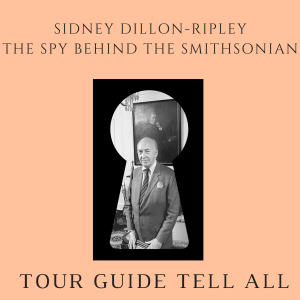
Thursday May 21, 2020
Sidney Dillon Ripley: The Spy Behind the Smithsonian
Thursday May 21, 2020
Thursday May 21, 2020
"He was once airlifted to meet a Thai King. He jumps out of a plane. He is holding a machine gun and he has a tuxedo in his backpack."
Sidney Dillon Ripley was a spy during WWII as part of the OSS (yes, he knew Julia Child - if you didn't know she was in the OSS, listen to our episode on her!). But mostly he used his time in the OSS to travel and collect bird specimens.
This came in handy when he was appointed as the Secretary of the Smithsonian Institution.
Support Tour Guide Tell All by becoming a patron: www.patreon.com/tourguidetellall
Comments or Questions? Or have an idea for future episodes? Email us tourguidetellall@gmail.com
If you're interested in in more information, we find these sources helpful:
- Oral Histories with Sidney Dillon Ripley: https://sova.si.edu/record/SIA.FARU9591
- New Yorker, Curator Getting Around
- Washington Post, Smithsonian Visionary Ripley Dies
You're Listening To: Becca Grawl, Rebecca Fachner
The Person Responsible for it Sounding Good: Dan King
Technical & Admin Work Done During Naptime: Canden Arciniega
Intro/Outro Music: Well-Seasoned from Audio Hero
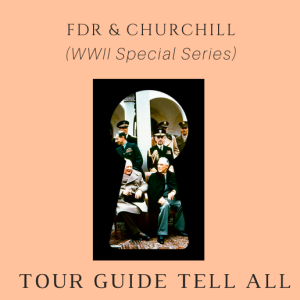
Sunday May 17, 2020
FDR & Churchill
Sunday May 17, 2020
Sunday May 17, 2020
"She has decided that married into the upper echelon is not enough for her only daughter. So Alva Vanderbilt decides in order to show up New York society she is going to get something for her daughter that you just can't get in the United States - a title"
Connections in history and between historical figures is one of the things that interest us most. Join us as we tell a story of a hidden and fascinating connection between two of the most fascinating characters in World War II. You’ll be surprised where this story ends up!
This episode is part of our WWII Series, #WWII75FTBF where we commemorate the 75th anniversary of VE Day, May 8, 2020.
Support Us by becoming a Patron - www.patreon.com/tourguidetellall
Comments or Questions? Or have an idea for future episodes? Email us tourguidetellall@gmail.com
If you're interested in in more information, we find these sources helpful:
You're Listening To: Rebecca Fachner
The Person Responsible for it Sounding Good: Dan King
Technical & Admin Work Done During Naptime: Canden Arciniega
Intro/Outro Music: Well-Seasoned from Audio Hero

Thursday May 14, 2020
Julia Child was a Spy? (WWII Special Series)
Thursday May 14, 2020
Thursday May 14, 2020
"One of the things she worked on was shark repellent. This was a big problem during the war. They were developing explosives to combat German U boats but these explosives were being set of by sharks, so they needed ways to repel sharks from the explosives. This was one of the things Julia Child was working on"
Before perfecting the art of French cooking, Julia Child worked at the OSS, the precursor to the CIA. Learn more about her work, her boss, Wild Bill Donovan, and actual spy, Virginia Hall.
Support Tour Guide Tell All by becoming a Patron: www.patreon.com/tourguidetellall
Comments or Questions? Or have an idea for future episodes? Email us tourguidetellall@gmail.com
If you're interested in in more information, we find these sources helpful:
- Julia's Marriage to Paul
- American History Museum: Julia Child's Kitchen
- The Child's Georgetown DC Home
- Wild Bill Donovan Bio: CIA
- New Yorker, Profile on OSS
- NPR, Virginia Hall
You're Listening To: Becca Grawl, Rebecca Fachner, and Canden Arciniega
The Person Responsible for it Sounding Good: Dan King
Intro/Outro Music: Well-Seasoned from Audio Hero
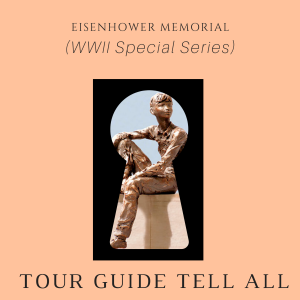
Sunday May 10, 2020
The New Eisenhower Memorial
Sunday May 10, 2020
Sunday May 10, 2020
“He's probably the last president that will get bipartisan support for a memorial. Democrats like him for big government things like the Department of Education and NASA and the interstate system - we love all that stuff - and of course he is a Republican, so that side of the aisle came on. So this was sort of a cool thing in D.C. at first to see both sides of the aisle to say, yes, we need an Ike memorial."
Tour Guide Tell All explores a new memorial - or at least, what we decided to call a new memorial even though it is not officially open or dedicated yet. The dedication of D.C.'s newest memorial has been postponed to September 17, 2020 but it is nearly completed, so we took a quick sneak peek.
Join us as we discuss the full-on DRAMA surrounding this memorial and its design and the unlikely story of how it finally came to life.
For a glimpse at behind-the-scenes video of the memorial, be sure to check out our YouTube channel: www.youtube.com/freetoursbyfoothq
Comments or Questions? Or have an idea for future episodes? Email us tourguidetellall@gmail.com
Support Tour Guide Tell All:
- Want to send a one off donation to support the podcast team? We have a venmo @tourguide-tellall
- Check out our STORE for Tour Guide Tell All podcast paraphenelia from tote bags to stickers - https://tour-guide-tell-all.myshopify.com/
- Become a Patron for bonus episodes and early release: https://www.patreon.com/tourguidetellall
If you’re interested in more information, we find these sources helpful:
- Eisenhower Memorial
- A First Glimpse of Frank Gehry's Eisenhower Memorial - Architect Magazine
- "Everyone Still Hates the Planned Eisenhower Memorial" - Washingtonian Magazine
- Q&A with Susan Eisenhower - Washingtonian Magazine
- "With groundbreaking, elusive Eisenhower Memorial moves from dream to reality" - Washington Post
- Eisenhower Memorial Review - Washington Post
You’re Listening To: Dan King, Becca Grawl, Canden Arciniega, & Rebecca Fachner
The Person Responsible for it Sounding Good: Dan King
Technical & Admin Work Done During Naptime: Canden Arciniega
Intro/Outro Music: Well-Seasoned from Audio Hero
